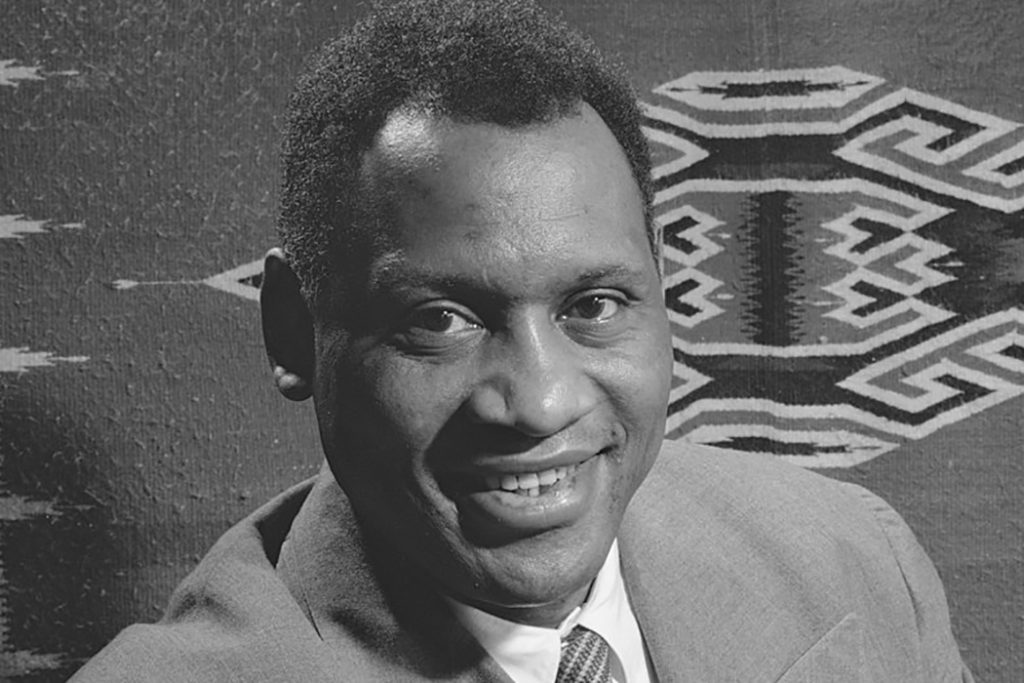Paul Robeson: April 9, 1898 – January 23, 1976
- Paul Robeson courageously integrated a sports team, but so did Jackie Robinson.
- Robeson brought Negro spirituals into our lives, but so did Bessie Smith.
- Robeson worked to have positive roles for Blacks in films, but so did Sidney Poitier.
- Robeson used his beautiful singing voice to connect us with global struggles for justice, but so did Harry Belafonte.
- Robeson used his celebrity to support union organizing, but so did Pete Seeger.
- Robeson inspired workers and students wherever he could find their audiences, but so did Fannie Lou Hamer.
- Robeson refused to sing before segregated audiences, but so did the Beatles.
- Robeson worked relentlessly against racial injustice, but so did Martin Luther King Jr.
- Robeson visited and raised solidarity for the people of Africa and for all oppressed people, but so did Malcolm X.
So what’s the big deal about Paul Robeson?
He did them first and he did them all.
I did not know of Paul Robeson, this “Great Forerunner,” when I was growing up in the fifties, and I didn’t even hear or read about him when I started teaching in Compton and hanging out in the Carson Library filling in all the empty spaces in my knowledge with as many Black people as I could read about in books for children. I only learned about him later when I started hearing of the activities of Oneil Cannon’s Paul Robeson Center and their successful campaign to get the U.S. postal service to honor his centennial with a commemorative postage stamp.
Time Magazine in 1943 called him, “probably the most famous living Negro;” a couple decades later in 1964, another writer called him “the best known American in the world.” So why is he so unknown today, at least in the U.S.? The whole answer is that throughout the McCarthy Era, even when he was before HUAC, he refused back down from the campaign against fascism and racism and for international socialism.
Happy 123rd birthday, Paul, our older brother!
I ask that we recognize three different groups of people who were — and are still today — victimized by the evils of the Cold War. The first were those who were not Communists but were falsely accused of being so, and these are the people whom we usually think of and hear stories about, those who are called its “innocent” victims.
The second group were those who were accused of being Communists and really were members or supporters of the Communist Party, as they had every right to be, for as Robeson bravely pointed out before the HUAC Committee, “The first to die in the struggle against Fascism were the Communists” and “It is a legal party.” These avowed Communists were just as innocent, just as undeserving of what they suffered.
But the third group victimized by McCarthyism is the rest of us, for we ended up with our unions and anti-war groups broken and still not fully recovered, with the era’s Taft-Hartley Act still stifling labor organizing, and with our movies, poetry, novels, and other arts (even the work that came from some of the same artists and writers as before) being less powerful than they had been previously. And those few artists who refused to be broken – like Robeson – were taken away from us, not allowed to perform, and erased from our history.
I believe we cannot consider the McCarthy Era to be truly over until we as a people can say and hear the word “communism” without cringing, till we repeal the Taft-Hartley Act, and till we reconnect our people with Paul Robeson. There are attempts to do just that: I have seen four different one-man shows about him by four different artists, he’s all over the internet now, and the National Archive has an extremely positive page about him for educators on their website.
I urge you to all listen to some of Robeson’s songs as well as his testimony to HUAC, today and on his birthday. (See links below.) In his testimony, you will hear a man who, instead of saying as little as he needed to get by, used every moment to tell the committee off, even accusing them, “You are the un-Americans, and you ought to be ashamed of yourselves!”
Robeson paid the price for his stance, as it usually happens when one speaks courageously in dangerous situations. After a concert at Peekskill, New York, his people were violently attacked with stones and bats while the police watched. Venues where he was scheduled to do concerts canceled them, recording companies would not record him, and stores withdrew his records from their stock, all under threats from the government. Plus, for eight years he was denied a passport and unable travel to any of the places where people still loved him and wanted to hear him. He was like a prisoner who could neither pass through the prison walls nor fully participate in activities within them.
During those eight years, he was limited to doing concerts at places wherever people who loved him bravely invited him to sing, including at the First Unitarian Church right here in L.A. A friend of mine once told me that when he was five, he got lost at a such an event at MacArthur Park. Robeson found him crying, looking for his parents, and so he walked through the crowd with the boy on his immense shoulders till he was able to reunite him with his parents.
But Robeson also did some remarkable things during this time. Eight months after the opening of the Trans-Atlantic telephone cable, he performed a concert through it for people in a London theatre. And at the Peace Arch on the Canadian border, tens of thousands, mostly on the Canadian side, attended a Robeson concert as he performed from the U.S. side.
When the Supreme Court finally restored his passport rights in 1958, it established that the State Department can not deny us our right to travel on the basis of our political beliefs or affiliations. Thank you, Mr. Robeson!
Passport back in hand, he immediately launched a successful singing tour and was soon performing Othello at Stratford-upon-Avon.
Robeson didn’t write his songs, but he sometimes rewrote them. In the movie, Showboat, he sang the lyrics to “Old Man River” just as Hammerstein had written them, “There’s an old man called the Mississippi. That’s the old man that I’d like to be. What does he care if the world’s got troubles? What does he care if the land ain’t free?” But later, by adding the single word “don’t, he changed it from Hammerstein’s world view to his own, singing, “That’s the old man I don’t like to be.”
By time he was singing this song at Peekskill and at Carnegie Hall, people no longer heard:
Tote that barge! And lift that bale!
Get a little drunk and you lands in jail.
I gets weary and sick of trying.
I’m tired of living but scared of dyin’.
And old man river, he just keeps rollin’ along,
but rather:
Tote that barge! And lift that bale!
Show a little grit and you lands in jail.
But I keeps laughin’ instead of cryin’.
I must keep fightin’ until I’m dyin’.
And old man river, he just keeps rollin’ along.
Let us come together on his birthday, celebrate what he gave us, and promise that we’ll keep fighting against injustice and violence until we’re dyin’.
Robeson Resources
- HUAC testimony (video) https://m.youtube.com/watch?v=akj4lrS1bFY
- HUAC Testimony (text) http://historymatters.gmu.edu/d/6440
- Peekskill videohttps://vimeo.com/268489071
- National Archives page for educators https://www.archives.gov/education/lessons/robeson
- Radio play inspired by Robeson’s life https://www.tayoalukoandfriends.com/paul-robesons-love-song
- Dr. Gerald Horne’s fascinating bio of Robeson https://www.publicbooks.org/what-the-left-today-can-learn-from-paul-robeson-an-interview-with-gerald-horne
Songs
- Old Man River (Carnegie Hall version) https://www.youtube.com/watch?v=-7oAn4Pydpo
- Shenandoah https://www.youtube.com/watch?v=9gtJkeXAMt0
- Joe Hill https://m.youtube.com/watch?v=n8Kxq9uFDes
- Deep River https://m.youtube.com/watch?v=9qXBG5BRT3c
- Jerusalem (words by William Blake) https://m.youtube.com/watch?v=gt-2Ijppbiw
[Carolfrances Likins is a board member of the Interfaith Communities United for Justice and Peace (ICUJP), a retired elementary teacher, and screenwriter. Article courtesy: LA Progressive, a Los Angeles based media organisation.]




